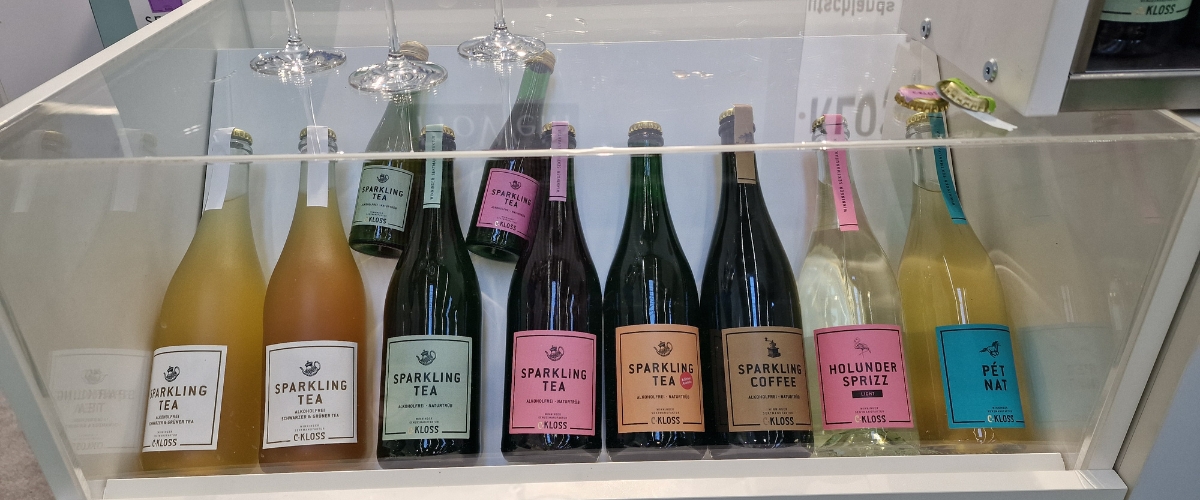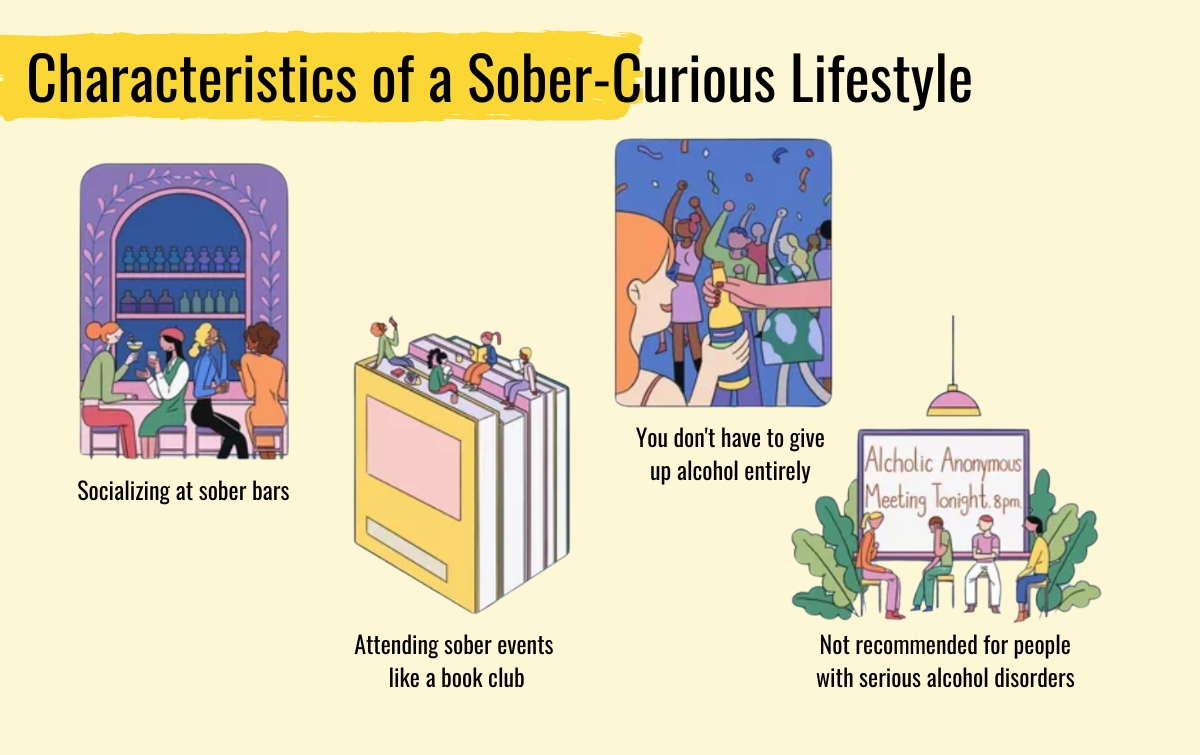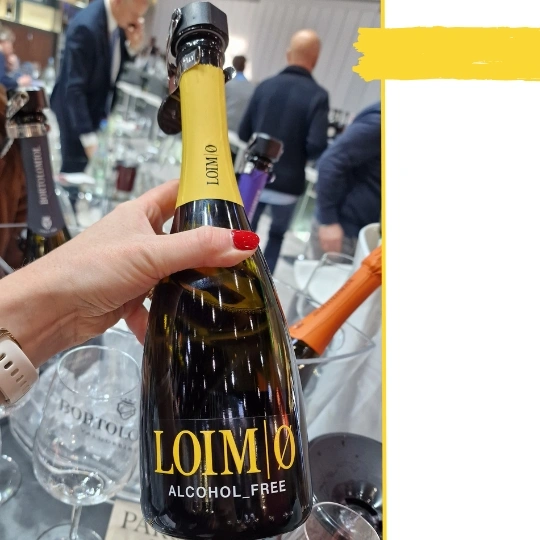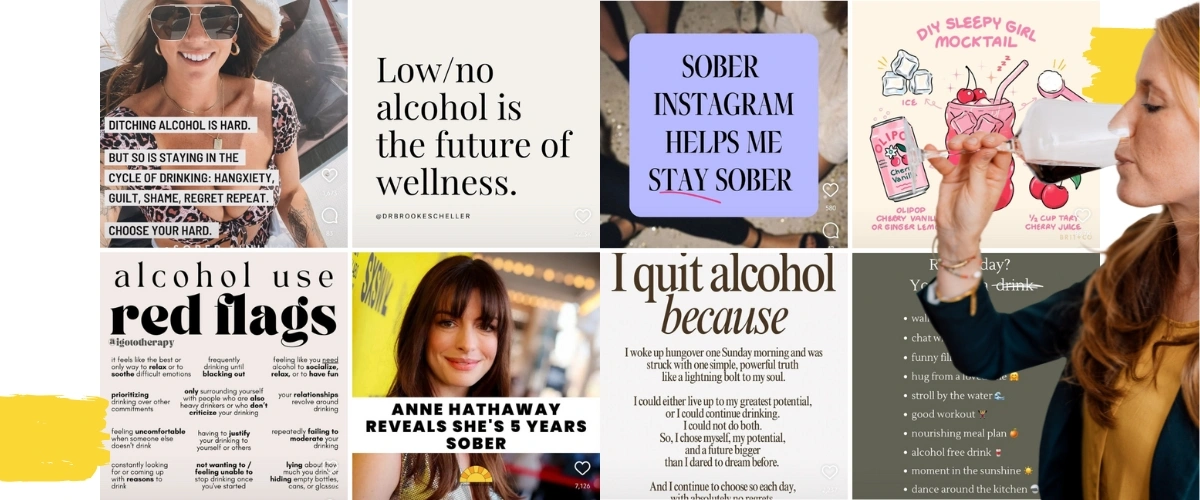Image Source: Wine with Margaret – Sober Curious Talk through Social Media
I increasingly get asked whether I sell alcohol-free wine, if I’d consider hosting a tasting on the topic, or if I know which alcohol-free wines actually taste good—because people have had too many disappointing experiences and end up sticking with alternatives like 0.0 beer or mocktails. I’ve been following the alcohol-free movement for years, and while it may have been seen as a trend at first, that’s no longer the case. In the Netherlands, the alcohol-free wine category has recently almost doubled. It may still be a small segment, but it’s no longer one to ignore.
With the growing movement toward drinking less—or complete abstinence, as recommended by celebrities and "gurus" all over Instagram—a whole generation is embracing this shift. But what about the wine industry? For years, we’ve heard that wine sales are declining, and this trend is continuing, whereas other categories—especially alcohol-free drinks—keep growing. So, what does this mean for the future of wineries? How relevant are these high-alcohol wines that are also packed with calories?
That’s why, at ProWein Tradefair in Düsseldorf, I immersed myself in the NOLO segment (No and Low alcohol) to explore all the amazing and delicious options this category has to offer. I followed an especially interesting talk about “When Health and Wellness are Top of Mind”, by Courtney Cochran and Felicity Carter.
You can check out this short video where Felicity Carter is talking about consuming alcohol and its health risks or does drinking wine does have benefits? (Go check it out!)
https://www.youtube.com/watch?v=QtJhb12a67E
Health Freaks with Smartwatches!
During my WSET Diploma studies, I realized that if I wanted to perform well, I had to prioritize my health. I needed to improve my sleep patterns, schedule more rest, and exercise to maintain my energy levels for hours of studying. So, I got a smartwatch.
Yeah, so what? Doesn’t everyone have one these days? Sure, I was a bit late to the game, but that also made me more aware of what I was doing to my body—especially during intense study periods. There was hardly any time for myself, just endless hours with my textbooks and a glass of wine to "stay in theme" with my studies. That one glass quickly turned into a second, and the next day, the cycle repeated.
I’ve never been a heavy drinker—I can probably count on one hand the times I’ve actually been drunk. But my watch made me painfully aware of the impact of those two glasses of wine: “High stress levels,” “poor sleep quality,” “restless night.” Those were the signals I got whenever I consumed alcohol. In contrast, when I didn’t drink, I’d see messages like “deep sleep, good rest.” (Of course, this isn’t an absolute rule—many factors influence sleep—but it’s a clear sign of what alcohol can do.)
And when I wanted to shed those last few pregnancy kilos, being aware of the calorie count in a glass of wine wasn’t exactly helpful either.
So, what happens in a world where countless people—especially younger generations—wear smartwatches? That’s right: we constantly monitor ourselves. We now visually see the impact of alcohol on our watches or phone apps, and as a result, we’re drinking less and less!
All these fit boys and girls who drink less—or not at all—sleep better, feel more energized, and maintain a healthier lifestyle overall. In such a lifestyle, does alcohol even fit anymore?

Image Source: Wine with Margaret
"Conscious Drinking"
Also known as mindful drinking—something that does fit within a healthy lifestyle. When you consciously choose to have a glass of wine, you savour it more; it’s no longer about drinking for the sake of drinking.
I remember when I was a teenager (about 20 years ago), the big question among us was: where and at whose place are we pre-drinking? Then we’d head to the bar and continue drinking. Nowadays, the question has shifted to: when shall we go for a drink? Gen-Z is very conscious of when they consume alcohol. The timing of alcohol consumption has changed drastically across generations.
For our parents’ generation (boomers), drinking wine happened during or after dinner. Today, alcohol consumption has largely shifted to the moment people get home from work. A drink with colleagues, an after-work wind-down, or just a good glass of wine on the couch with a snack. Often, this happens before dinner. During dinner, many no longer drink—so the alcohol is out of their system well before bedtime, ensuring minimal impact on sleep and a fresh start the next day.

Image Source: Verywell mind & altered by Wine with Margaret
Sober Curious
All over social media you see ‘alcohol sober talks and phrases’, influencers that became important because they talk about a lifestyle without any alcohol, celebrities that talk about their sober journey. And even those that used to be heavy drinkers, are saying that the online communities like these are helping them to stay sober. Even the book ‘Sober Curious’ is devoted to creating a lifestyle that is moderating alcohol or even skipping it entirely.
Sober Curious—the now well-known movement that can drastically change your life. Social media is full of it, and there’s even a book about it.

Do you always have a bottle of wine or beer on the table at home? Is a Friday office drink without alcohol even a real borrel? And what about that post-workout pub visit? Alcohol is deeply embedded in our culture.
That’s why being Sober Curious means questioning your alcohol consumption: When do I drink? Why do I drink? How much do I drink?
By doing this, alcohol consumption stops being an automatic habit, and instead, you take on a more curious mindset. Being Sober Curious means becoming aware of how alcohol affects your body and mind. Here are some key benefits of reducing or eliminating alcohol:
- You feel happier and more energetic.
- You sleep better.
- Your immune system improves.
- Your skin glows.
- Your workouts become more effective.
- Your fertility increases (for both men and women).
- You reduce your risk of serious diseases like cancer and heart disease.
- You improve your sex life (yes, really!).
- You lose weight—because let’s not even get started on all those wine calories.
The internet is full of tips on adopting a Sober Curious mindset. Ultimately, it’s about becoming aware of when and why you reach for alcohol—and knowing that you always have a choice. The key takeaway? Everything in moderation, and when you do drink, be mindful about it.
Do You Call Yourself a “Flex-Drinker”?
What’s that—another new trend? Not really. A Flex-Drinker is someone who drinks alcohol occasionally. Think of the “Flexitarian,” who eats mostly vegetarian or vegan meals but occasionally has meat or fish. The same concept now applies to alcohol. A Flex-Drinker drinks alcohol sporadically, only when they truly make time for it—more mindful drinking.
A quick Google search won’t yield much data on “Flex-Drinking,” but the trend is rising. The Dutch CBS statistics show that while alcohol consumption among older generations isn’t (yet) decreasing significantly, younger generations are leading the way in overall abstinence. And let’s be honest—it’s always the younger generations who drive new trends. This shift is shaping the future of an age-old industry, making alcohol-free drinking the norm.
Why Wineries Can No Longer Ignore Alcohol-Free
Should every winery switch to alcohol-free wine or alternatives? Yes—if they want to remain relevant in this changing landscape. By embracing industry trends, wineries can retain loyal fans who occasionally opt for alcohol-free options or even tap into an entirely new market.
How? Explore alcohol-free alternatives—whether dealcoholized wines, grape-based drinks, fermented teas, or kombucha—without compromising your brand’s authenticity.
Take inspiration from wineries like Bortolomiol Estate, which created a high-quality alcohol-free alternative to Valdobbiadene Prosecco. It’s exotic in aroma, expressive like the Glera grape, and well-balanced—not overly sweet (20g/l RS) but a genuinely exciting glass of alcohol-free wine. Truly an exciting glass of wine. Check out its labelling, spot on and on trend, do you want more? Well done! So?

The Rise of Alcohol-Free Is Unstoppable
The wine industry is evolving, and alcohol-free is no longer a niche or a passing trend—it’s a fully-fledged segment with enormous growth potential. Gen-Z and Millennials prioritize health and awareness, and technology like smartwatches reinforces this shift.
Wineries that want to stay relevant must take this shift seriously. Whether through premium dealcoholized wines, innovative alternatives, or smarter packaging, the future lies in flexibility and adaptability. It’s no longer about drinking for the sake of drinking—it’s about intentional enjoyment.
Those who cling to the old model risk being left behind. The Flex-Drinkers, the Sober Curious, and the conscious consumers are shaping the future of wine. And that future is already here.

